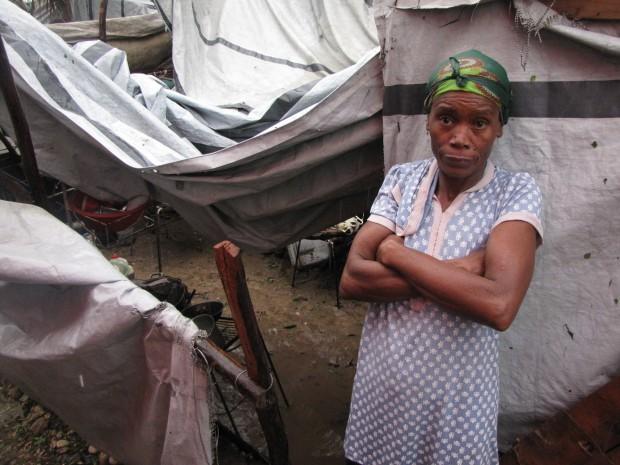Invisible Grace
A woman in one of Haiti’s make-shift camps after Hurricane Isaac, then a tropical, passed over the country. (Photo: Amy Bracken)
A few months ago, it was impossible to move around Port-au-Prince unaware of the thousands of families still homeless after the January 2010 earthquake. Tent camps – with their tattered blue and gray tarps and make-shift structures of plywood and rusting metalware – were set up in the streets, on median strips, and in the main parks of Petion-Ville and Port-au-Prince. Men, women and children bathed in buckets in the street.
Now it’s frighteningly easy to forget. The government and international NGOs moved people out of the most visible places, by handing out cash or housing assistance. Earlier this summer, Champs de Mars, the city’s main square, was cleared of its hundreds of post-quake inhabitants in time for the president to organize a massive Carnaval there. It made up for the cancellation of the regular spring Carnaval, which was impossible because of the homeless inconveniently set up right where the celebration would have taken place.
Haiti’s president and government clearly recognize the psychological, economic, and political importance of offering free entertainment, and for Port-au-Prince residents to have their parks back. Now the giant national palace, slumped and deflated since the earthquake like a slain dragon, is being demolished. There is much to be said for boosting people’s spirits by clearing away the constant reminders of the suffering caused by the unspeakably horrific tragedy of 2010. But there are also potential consequences.
The approach of Hurricane/Tropical Storm Isaac made Haitians and the international community turn their attention, at least for a moment, back to the most vulnerable. As the storm approached, official addresses and public service announcements aired repeatedly on radio stations calling on Haitians to remember the elderly and the handicapped and to exhibit solidarity.
One announcement concluded, ‘One for all, and all for one,’ in an odd twist on Haiti’s motto: L’Union Fait La Force, there is strength in unity. And local and foreign journalists asked how people still living in tents would survive the storm’s heavy winds and torrential rain.
On Saturday morning, after a sleepless night (even for those of us in secure, solid housing), for the first time after arriving here two weeks ago, I began visiting camps.
Two of them were in Carrefour, the crowded and largely chaotic city on the western edge of Port-au-Prince. The first one, Camp Marine, on the main road outside the Coast Guard station, was full of tiny make-shift shelters with now muddy earthen floors, damp beds, and rain still dripping through many spots of the tarp ceilings. Some families had fled overly wet shacks to squeeze in with neighbors in equally cramped but slightly dryer structures.
They simply had no better refuge. Everyone I spoke with had lost the homes they rented in the earthquake, are now unemployed, and simply have no means to find housing.
At the next camp, Grace Village, the situation was even worse. It took some time to find the place because it was off a side road and the main gate was locked shut. We entered a back way, through a winding road, a rushing stream, muddy ground, and another gate. Many of the hundreds of shelters had collapsed from the wind and rain, one crushed by a falling tree, but everyone was talking about the death of a baby in the night.
A young mother’s nine-month-old baby had fallen ill. An emergency vehicle was summoned but wasn’t able to enter because the nearby gate was locked and no one had the key – no one but the property owner. The vehicle came around the long way, and the baby died.
There’s no knowing what the fate of the baby would have been had the gate opened, but no matter, camp residents were livid.
‘They’re imprisoning us!’ people kept yelling, pointing toward the closed gate. On the one hand, they were shut in; on the other, resident upon resident made the same claim: the property owner was trying to drive them out by making life there as miserable as possible – by sending police in to arrest people and force them out into the street, and reportedly sending thugs in to beat people up and destroy the toilets and solar street lamps NGOs had set up. They were deprived of basic services, such as food and water, and of the right to move about freely.
Who is this landowner? A pastor, who reportedly initially welcomed earthquake victims to the grounds of his ‘Grace Village’ but then decided he had had enough.
Macsonne Polyte, a city council member who visits the camp regularly, called the situation an outrage.
“Haitian law says you cannot mistreat people,” he said, referring to Haiti’s constitutional guarantee of decent housing for all of its citizens. But, he added, “the law of the pastors says you must mistreat people,” an allusion to allegations that the pastor is doing all he can to make life unbearable for the squatters.
But Polyte later acknowledged that this situation is really a failure of the state. “You look at the condition people are living in. You know how many thousands were spent on the various Carnavals all over the country?”
I was unable to reach the pastor or anyone who could defend him, but whatever the politics of Grace Village – the who paid who to do what, and the who has the right to what land – it remains a scandal that hundreds of men, women, children and babies are living in this kind of unbearable squalor behind closed gates, out of site and out of mind.
According to the latest figures from the International Organization for Migration, almost 400,000 Haitians are still homeless, and often there is no sign of efforts to make their lives any better.
